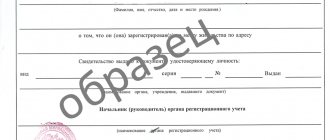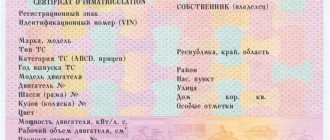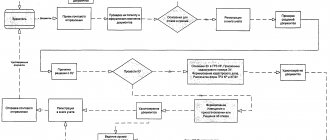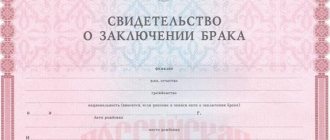- What is a certificate of state registration (SGR)
- Validity period of the certificate of state registration of products
- Unified list of products subject to state registration
- Children's products subject to state registration
- Perfume and cosmetic products subject to state registration
- Food products subject to state registration
- The main stages of obtaining a certificate of state registration of products
- Documents submitted by the applicant
- Obtain a certificate of state registration of products
What is a certificate of state registration (SGR)
| State registration of products is an official document confirming that a product or product has passed the state registration procedure, is included in the appropriate state register, and also complies with the established hygienic sanitary rules and standards adopted and in force in Russia. | Order service |
This type of document refers to one of the methods for regulating the quality and safety of products or other objects at the state level.
Where did this information come from?
On September 12, 2021, the Federal Tax Service of Russia approved Order N ММВ-7-14/ [email protected]
“On approval of the form and content of a document confirming the fact of making an entry in the Unified State Register of Legal Entities or the Unified State Register of Individual Entrepreneurs, declaring certain orders and certain provisions of orders of the Federal Tax Service as invalid.”
The full text of the Order can be found on the official legal information portal.
It was this September Order of the Federal Tax Service of Russia that canceled the registration certificates of legal entities and individual entrepreneurs. Paragraph 3 of this document established that the Order came into force on January 1, 2021. Hence the deadline.
Information about innovations is also available on the website www.nalog.ru. For example, you can look here.
Unified list of products subject to state registration
Products subject to state registration are listed in Section II of the list of goods that fall under sanitary and epidemiological control. The list was approved by decision of the Customs Union Commission dated May 28, 2010 No. 299 “On the application of sanitary measures in the Customs Union.”
Among such products are:
- biologically active additives;
- sports nutrition;
- products containing alcohol, including beer and low-alcohol drinks;
- bottled drinking water and table mineral water;
- food additives and flavorings;
- drinks with tonic properties;
- baby food;
- cosmetics (with the exception of special preparations);
- biological and chemical substances or materials that pose a danger to the environment and humans;
- household chemicals;
- disinfectants;
- transgenic products;
- paint and varnish products (primer, varnishes, mastic, enamels, putty, putty);
- personal hygiene items for children or adults;
- equipment used in drinking water supply systems;
- products for nursing mothers or pregnant women.
The list is valid until the technical regulations of the Customs Union come into force, which establish a different form of confirmation of conformity for such products. For example, packaging materials were automatically excluded from the list after the CU TR “On the Safety of Packaging” came into effect (after July 1, 2012), which specified only the mandatory declaration of packaging. If one of the forms of assessing product conformity in technical regulations is state registration, then a certificate of its registration must be obtained in accordance with the requirements of such a document. Products are still excluded from the Unified List.
How to restore an IP certificate
What should those individuals do who have lost their individual entrepreneur certificate? Is it possible to obtain a duplicate of this document? Who should I contact and what information should I provide? As such, restoring the individual entrepreneur certificate, that is, obtaining a repeat form, is impossible, since the regulatory legal act that approved the form has already been canceled. But do not rush to get upset, there is no need to issue a certificate. If the document is lost, you need to request an extract from the Unified State Register of Individual Entrepreneurs.
The request is made in writing upon application to the Federal Tax Service by the taxpayer or his representative. Or you can get an extract on the tax office website, in the appropriate section. A document certified by an electronic signature of tax officials will have full legal force. Thus, an entrepreneur’s certificate no longer needs to be required from counterparties to verify the reliability of suppliers of goods or services. A record sheet from the unified register will also serve as a form confirming the legal activity.
Validity period of the certificate of state registration of products
From July 20, 2021, the validity period will be indicated in the SGR. A certificate of state registration will be issued for a period of 5 years, unless otherwise stated in the regulations themselves.
Previously, such a document was indefinite and was valid until the end of product deliveries, changes in its production technology affecting safety, etc. At the same time, the “indefiniteness” of the SGR does not completely disappear; if its validity period is not limited, then it is indicated in the required field.
It will also be possible to draw up the SGR electronically; with this design, the typographic number of the form will not be established in the document. Read more in the news.
Individual entrepreneur certificate - sample
Let's look at what an individual entrepreneur certificate looks like - photos are given for all possible forms. Let's start with the form f. R61001 according to Order No. 439 of June 19, 2002. As can be seen in the photograph, this document contains the main registration number of the created entrepreneur, the date of making the corresponding entry in the Unified State Register of Individual Entrepreneurs, the name of the control government agency, signature, full name and position of the responsible tax inspector. The form is printed on a special form, protected in all possible ways and marked with a series and number. This is exactly the form that was issued to citizens when creating an individual entrepreneur earlier.
Figure No. 1 – certificate according to f. P61001.
To replace f. P61001 received form P61003 according to Order No. ММВ-7-6 / [email protected] dated November 13, 2012. This document, in principle, is not much different from its predecessor, which can be seen in Figure No. 2. The registration number (OGRNIP) is also indicated here. an individual in the status of an entrepreneur, the date of making entries in the register, the name of the territorial division of the Federal Tax Service, the position and full name of the responsible employee, as well as his personal signature. Added a line for the date of issue. P61003. The document is printed on special paper with a hologram and other levels of protection.
Figure No. 2 – certificate according to f. P61003.
Finally, let's look at what the record sheet f looks like. P60009, relevant for the registration of entrepreneurs from 01/01/17. This document is drawn up on plain paper, without any special degrees of protection, but also contains all the necessary details, including a record of a citizen acquiring the status of an individual entrepreneur. First of all, this is confirmed by the main registration number (OGRNIP), the date of making such an entry, and the name of the territorial tax service. Personal information about the individual is provided separately.
Figure No. 3 – recording sheet according to f. P60009.
Children's products subject to state registration
State registration is provided for certain types of products intended for young children. In this case, it is necessary to obtain not only a certificate of state registration of such goods, but also then register a declaration of conformity, as defined in Article 12, paragraph 2 of the technical regulations of the Customs Union “On the safety of products intended for children and adolescents.”
Among the products for children under 3 years of age that are subject to state registration, the following products can be distinguished:
- various nipples, pacifiers;
- nappies, diapers, as well as sanitary cotton swabs and other products for child care;
- dishes and cutlery;
- toothbrushes, gum massagers;
- swimwear, underwear, including rompers, undershirts;
- summer hats, etc.
Perfume and cosmetic products subject to state registration
State registration is carried out in the production of children's cosmetics, as well as perfume and cosmetic products for adults made using nanomaterials. The procedure for obtaining a certificate of state registration of such goods is enshrined in the technical regulations of the Customs Union “On the safety of perfumery and cosmetic products.”
Also, Appendix No. 12 to the technical regulations defines a list of certain types of cosmetic products, the safety of which must be confirmed in the form of state registration. These products include products for:
- artificial tanning;
- skin lightening;
- protecting the skin from harmful production factors;
- hair coloring, lightening, highlighting, curling;
- depilation, etc.
The need to obtain a State Registration Certificate for such products is determined by high sanitary, epidemiological and hygienic safety requirements, which are controlled during the process of their state registration.
Food products subject to state registration
State registration is provided for two types of food products: specialized and new types. Both of these concepts, as well as the need to obtain a State Registration Certificate, are disclosed in the technical regulations of the Customs Union “On the safety of food products.”
Specialized food products are understood as products for which requirements for the content of individual substances have been established and/or this content has been changed relative to the natural composition. Specialized products may include substances or components that are not originally present, and they may also be intended as prophylaxis or treatment for certain categories of people. The profile technical regulation of the Customs Union “On the safety of certain types of specialized food products, including dietary therapeutic and dietary preventive nutrition” establishes mandatory state registration of such products.
Also, specialized products include:
- baby food products, including drinking water;
- natural mineral, medicinal table, medicinal mineral water;
- food products for athletes, pregnant and lactating women;
- biologically active food additives (BAA).
New type food products are understood as products manufactured using previously unknown technologies, composition, for example, with a new or deliberately changed primary molecular structure. The specialized technical regulations of the Customs Union “Requirements for the safety of food additives, flavorings and technological aids” define state registration for food additives of a new type.
The procedure for state registration of food products is enshrined in the general technical regulations of the Customs Union “On the safety of food products”, namely for specialized products - in Article 25, for products of a new type - in Article 28.
State registration is established in separate specialized technical regulations of the Customs Union for juices and fat and oil products, in cases where such products are recognized as specialized or of a new type.
In addition, until February 15, 2015, state registration of goods remains mandatory:
- food additives, flavorings, plant extracts, enzyme preparations;
- food products obtained using GMOs.
Various bodies of the federal service for supervision in the field of consumer rights protection and human well-being are responsible for issuing SGR, depending on the type of product. In accordance with the order of Rospotrebnadzor dated July 20, 2010 No. 290, territorial bodies carry out state registration of the following goods:
- table mineral water, drinking bottled water, with the exception of water intended for feeding young children;
- alcoholic products, including low-alcohol drinks and beer;
- cosmetic products, with the exception of certain types of such products, for example, products for skin whitening, applying patterns to the skin without injection;
- household chemical goods;
- personal hygiene items for children and adults;
- baby food products for children of preschool and school age (from 3 to 14 years old), etc.
State registration of other types of goods is carried out in the central body of Rospotrebnadzor.
There is also a difference in the moment of state registration. For products manufactured on the territory of the member countries of the Customs Union, it is necessary to obtain a certificate at the stage of putting it into production. For imported goods, state registration is required before they are imported into the Customs Union.
You can find a detailed list of each type of product subject to state registration here.
Are duplicates of technical documentation necessary?
If you have lost your technical or cadastral passport or other technical information, do not panic.
These types of documents have a limited shelf life. Therefore, if you lost technical documentation a year or later after the transaction, then the lost document will be invalid anyway. There are no established deadlines for replacing technical passports. But as an unspoken rule, specialists at technical inventory enterprises consider the period to be from one to five years. Most likely, to complete the transaction you will need a new passport, and not the one according to which the object became your property. Therefore, do not rush to replace a lost or damaged document. If necessary, it is better to take a new one, with fresh technical data.
Since 2021, such a document as a cadastral passport has been abolished altogether. Information from the state cadastre was combined with the Unified State Register of Real Estate databases. And now all the necessary information is available in Rosreestr; there is no need to order it separately.
The main stages of obtaining a certificate of state registration of products
The process of state registration of products can be divided into the following stages:
- registration and acceptance of application;
- study and analysis of documents submitted by the applicant characterizing the properties of the product and its compliance with existing and current standards, requirements and rules (for each type of product the list of such requirements is unique);
- examination of the results performed in the testing laboratory, issuing toxicological, sanitary, hygienic and other types of product assessment;
- coordination of the collected data with the legislation of the “party” where the registration is carried out (if necessary);
- entering information and data about products into the State Register (upon successful completion of the state registration procedure);
- registration and issuance of state registration documents for products.
Documents submitted by the applicant
For Russian products
- Application for state registration of products;
- Regulatory and/or technical documents approved in the established manner (technical conditions, technological instructions, recipes, etc.) not previously agreed upon, according to which it is intended to carry out industrial production of products, certified in the manner established by the legislation of the Russian Federation;
- Duly certified copies of sanitary and epidemiological reports on the compliance of technical documents with the requirements of state sanitary and epidemiological rules and regulations (if any);
- Duly certified copies of sanitary and epidemiological reports on compliance of production conditions with the requirements of state sanitary and epidemiological rules and regulations;
- Instructions for use (insert leaflet, annotation) (in case all the necessary information cannot be placed on the label), certified by the signature of an authorized person and the manufacturer’s seal;
- Consumer (or container) label or its draft, certified by the signature of an authorized person and the seal of the manufacturer;
- Test reports and/or conclusions of accredited testing laboratories (if available);
- The act of sampling (sampling) in the established form;
- If there is a trademark - a copy of the trademark certificate, certified in the prescribed manner;
- A document from the manufacturer stating that he trusts the applicant to represent his interests on the territory of the Russian Federation in carrying out state registration of the manufacturer’s products (if the applicant is not a manufacturer);
- A document confirming the right to obtain a certificate of state registration of products (power of attorney).
What documents does the tax service now issue after registering an LLC upon creation?
For new LLCs whose registration documents were submitted after January 1, 2021, if a positive decision on registration is made, the tax service issues:
- Unified State Register of Legal Entities;
- One copy of the LLC charter with the mark of the registering authority;
- Certificate of registration of a Russian organization with the tax authority at its location on a regular A4 sheet.
This is a list of documents for the case when additional documents were not requested by the applicant.









